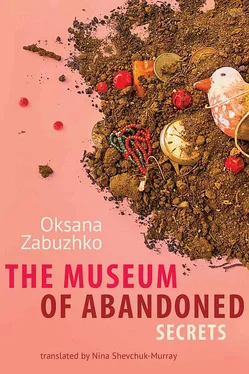“And not just artists,” the reporter agrees, after she stops chuckling. “The same is true for our scientists who get hired into Western universities when their ideas don’t interest anyone at home, and for our intellectuals who follow grant money abroad because they’ve got nothing here. The country’s best minds are leaving in droves, and I’m afraid if this goes on at the same rate for another ten or fifteen years, we’ll all be running around on all fours by then. Still, Vlada, you and I are optimists, aren’t we?”
[The blonde narrows her eyes skeptically, taking aim at the next statement, which will determine whether she will, in fact, remain an optimist. This causes tiny creases to shoot across her temples, and for an instant, her face gains the heartbreaking sculpted perfection that will become fully hers in a few more years—the perfection of character manifest, which makes some women more striking in middle age than they ever were in youth—another two, three years and the blonde, if she remains a blonde will grow into her own and become perfectly, dramatically beautiful.]
“So what if the recognition you’ve achieved in the West today translates into little more than envy at home? Objectively,” [The brunette’s poppy-red, Guerlain-lipstick-stained mouth enunciates the last word with a sexy air-kiss, draws it out as if in bold italics—she is addressing an imaginary TV audience, not just her friend.] “you still work for the benefit of this nation, even when it can’t, as you put it, keep up, and in particular, loses track of its own rapidly changing ideas of itself which, to me, is an important issue.” [The blonde murmurs something affirmative; she must find the didacticism boring.] “Ukrainians are known to suffer from chronically low self-esteem, so every time one of ‘us’ is recognized by ‘them,’ it’s salve for our long-cherished national wounds. So, let’s talk about this thing, your show. First, could you explain the title, Secrets ?”
“Well, the whole idea grew out of a game we played as kids: remember, back when we were little, in the sixties and seventies, all girls made ‘secrets’?”
“Of course I do! And here’s something—only girls did, no boys allowed, right?”
“Nope, strictly no boys, not even friends, I remember that.” [The blonde pushes away a strand of hair that’s fallen into her face and with it, it seems, thirty years worth of memories.] “I had a friend like that; we played house. I was Mom; he was Dad, but even he was not privy to secrets…”
“Not to change the subject, but I’d like to ask—when you were little, did you play more with boys or with girls? Because there’s this theory that all socially successful women are products of what’s called masculine socialization, meaning they were raised more like boys.”
“I don’t know…. No, I wouldn’t say so. No, we girls played like we were supposed to, dolls, clothes for them—I was the prime seamstress in our yard, I liked that a lot…. No, I think something else is important.” [She thrusts up her chin resolutely; her eyes flash, cat-like, and change color: a minute ago, as she was searching her memory, they were infant-like, watery-gray, but now, powered by a fully formed, ready-to-roll idea, they oscillate with a piercing steel-blue current—the cameraman must be in heaven. It’s not often that you find a face as expressive as this one, whose surface, like clear water, shimmers with light reflected off every motion beneath.] “You know what really made a difference? Being a Daddy’s girl. Dad was the key figure for me. He was the one who taught me to draw, you know, then took me to art school every morning; his word was law for me, for a very long time. I still consider him a much-underappreciated artist; some of his pieces are terribly interesting, especially his non-figurative works, but you know what the official take on abstraction was in Soviet times. Actually, this is insanely interesting when you think about it—I think you’re onto something here, with what makes women successful. All the girls I know, the ones who got somewhere, they’re all Daddy’s girls, and you are, too, aren’t you, Dar?” [The brunette nods silently.] “ You can find this even in folktales: it’s always the wife’s daughter, Mommy’s girl, who loses out, and the man’s daughter brings home a treasure—ostensibly because she works hard and the other girl is lazy, but what if the wife’s daughter just doesn’t know any better? Hasn’t been properly socialized, you know? She’s got no clue how to behave among strangers, what to do to gain their confidence, how to work behind the scenes toward her goals—she just blurts it all out, like to that sorceress…”
“The Snake Queen,” prompts the brunette.
“Yep, the Snake Queen. The chick turns up in the palace and rattles off her list of wants, as if to her own mommy. She’s like a domestic savage, isn’t she? It’s like, for generations our women didn’t have the skills to teach their girls how to behave outside the home—you needed a man for such advanced politics.” [Forgetting herself, the painter bites her nails in concentration, but realizes what she’s doing and stops; her hand, in contrast to her petite figure, is substantial and strong, with a wide palm and unmanicured nails—an expressive hand, an honest craftsman hand. The nail-biting will get cut when the footage is edited.]
“And if we consider,” picks up the interviewer, [She works the idea like a thread, smoothing it out, reeling it around the spool.] “that the nineties gave us our first, for all intents and purposes, generation of single mothers, a generation of women who were no longer…” [She rounds her mouth again and leans into the word as if pushing against a locked door.] “afraid of raising a child by themselves, what kind of future, do you think, will their—our—daughters experience? Will you be able to ensure that your Katrusya is properly socialized? Enough so,” [A professional half-smile, caught in the corners of her mouth, puts the next phrase in invisible quotes.] “that she won’t lose her bearings in front of any snake queens?”
“I think so,” the painter answers after a moment’s hesitation, firmly and without a smile. [It is clear that this was the question she was trying to answer earlier with her fairytale ideas.] “I very much hope so.”
“Back to secrets—does Katrusya make them, like we did?”
“Are you kidding?” [The painter waves the reporter off, and laughs, with the shy pride of a parent outrun by her child.] “Kids only play computer games now. And, I must add, I think they do get worn out by being constantly bombarded with visual information—it’s like there’s this chromatic noise around them, all the time. Think of the world we grew up in—how much grayer it was…”
“Oh, yeah.” [The reporter groans from outside the frame.]
“How hungry we were for color. Remember our collecting craze—and for what? Colorful candy wrappers—the brighter the rarer!”
“And the more precious,” adds the journalist [with full professional competence, intent on getting all the facts straight]. “I remember how I envied a girl next door, whose father was one of the few people who got sent abroad every so often and brought her foreign candy—she had the most extravagant collection on our block; you didn’t know what to look at first.”
“Sure, I have stories like that too. And now, think how you made a secret. First you dug a little hole in the ground and lined it with something shiny, like a foil wrapper from a chocolate bar—and actually, such glimmering backgrounds that provide a deeper perspective are common for folk-art icons, the late ones, from the end of the nineteenth century, when they were being made by factory co-ops. You can still find some out in the country.”
Читать дальше












